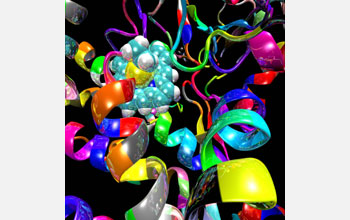|

Press Release 07-128
NSF Announces $26 Million Solicitation for Projects That Advance Innovative Computational Thinking

Total cyber-enabled discovery and innovation spending to reach $52 million this year

Protein-binding model of cytochrome P450, a heme enzyme responsible for drug metabolism in the body.
Credit and Larger Version |
October 1, 2007
The National Science Foundation (NSF) announced a solicitation for projects to advance innovative computational thinking, the newest multidisciplinary, multiyear initiative called Cyber-Enabled Discovery and Innovation (CDI). CDI research outcomes are expected to produce paradigm shifts in our understanding of a wide range of science and engineering phenomena and socio-technical innovations that create new wealth and enhance the national quality of life. Funding for this first project will range from $26 to $52 million, NSF's commitment to the CDI initiative for fiscal year 2008, and is expected to grow $50 million in each of the next five years. With this investment, NSF wishes to attract researchers to create revolutionary science and engineering research outcomes made possible by innovations and advances in "computational thinking," defined comprehensively as computational concepts, methods, models, algorithms, and tools. CDI seeks ambitious, transformative, multidisciplinary research proposals within or across the following three thematic areas: A competitive CDI proposal will: For additional information about CDI, please visit http://www.nsf.gov/crssprgm/cdi/index.jsp.
-NSF-

Media Contacts
Lisa-Joy Zgorski, NSF (703) 292-8311 lisajoy@nsf.gov
Dana W. Cruikshank, NSF (703) 292-8070 dcruiksh@nsf.gov
Program Contacts
Sirin Tekinay, NSF (703) 292-8080 cdi@nsf.gov
Eduardo A. Misawa, NSF (703) 292-8080 cdi@nsf.gov
Thomas F. Russell, NSF (703) 292-8080 cdi@nsf.gov

The National Science Foundation (NSF) is an independent federal agency that supports fundamental research and education across all fields of science and engineering. In fiscal year (FY) 2009, its budget is $9.5 billion, which includes $3.0 billion provided through the American Recovery and Reinvestment Act. NSF funds reach all 50 states through grants to over 1,900 universities and institutions. Each year, NSF receives about 44,400 competitive requests for funding, and makes over 11,500 new funding awards. NSF also awards over $400 million in professional and service contracts yearly.
 Get News Updates by Email Get News Updates by Email
Useful NSF Web Sites:
NSF Home Page: http://www.nsf.gov
NSF News: http://www.nsf.gov/news/
For the News Media: http://www.nsf.gov/news/newsroom.jsp
Science and Engineering Statistics: http://www.nsf.gov/statistics/
Awards Searches: http://www.nsf.gov/awardsearch/
| 


